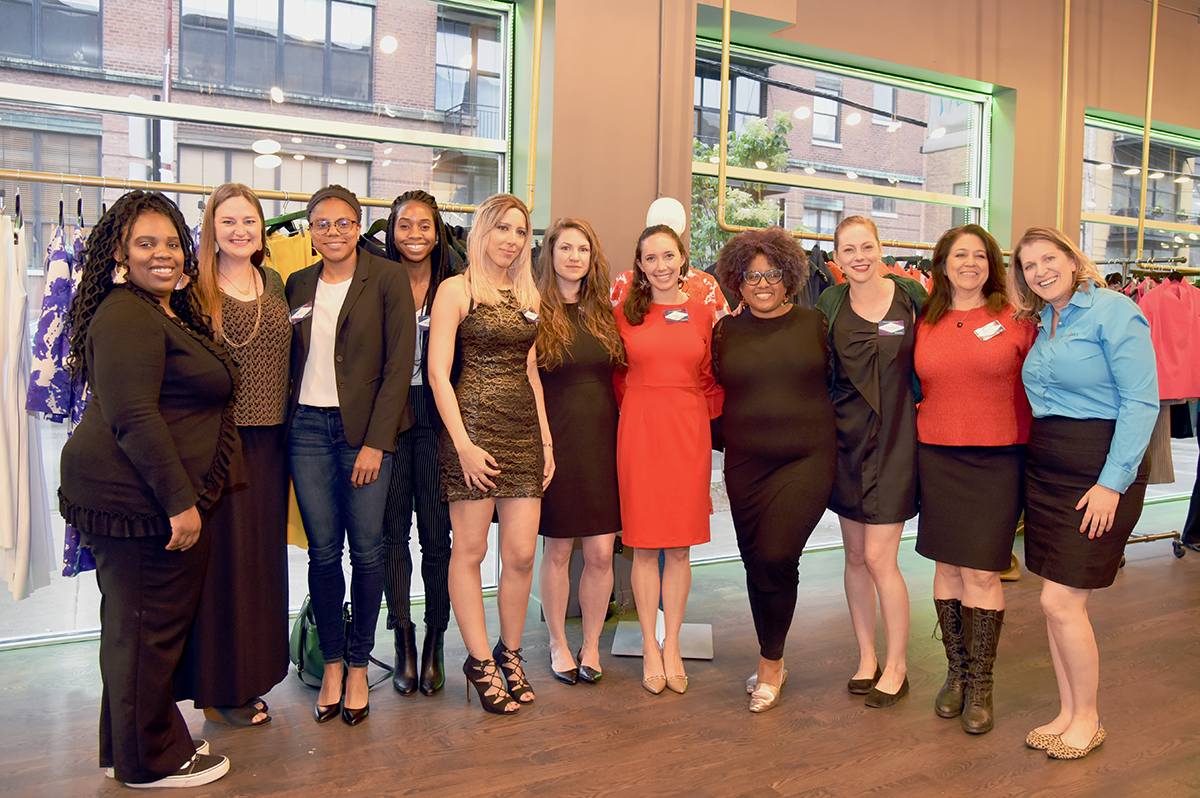 In 2019, the Women in Entrepreneurship launched the Business Accelerator Program, welcoming the first accelerator cohort (left to right): Jennifer Spraggins (MBA ’18), Melissa Ames, DePaul student Parker English, Margaret Bamgbose, Soumaya Yacoub, WEI director Abigail Ingram (LAS MA ’15, JD ’18), Elise Gelwicks, Nika Vaughn, Elizabeth Ames-Wollek (MBA ’15), Nora Wall and Michelle Frame. Not pictured: Ariana Lee (BA ’19) | Photo by Kathy Hillegonds
In 2019, the Women in Entrepreneurship launched the Business Accelerator Program, welcoming the first accelerator cohort (left to right): Jennifer Spraggins (MBA ’18), Melissa Ames, DePaul student Parker English, Margaret Bamgbose, Soumaya Yacoub, WEI director Abigail Ingram (LAS MA ’15, JD ’18), Elise Gelwicks, Nika Vaughn, Elizabeth Ames-Wollek (MBA ’15), Nora Wall and Michelle Frame. Not pictured: Ariana Lee (BA ’19) | Photo by Kathy HillegondsDePaul’s
Women in Entrepreneurship Institute (WEI) launched the Business Accelerator Program two years ago, welcoming 11 founders of women-owned businesses to its inaugural cohort. Designed and delivered by successful women entrepreneurs, WEI’s nine-week
accelerator program prepares founders to launch or scale their businesses. WEI recently closed applications for the program’s fourth cohort.
As the COVID-19 virus spread to the U.S. in early 2020, small businesses everywhere suffered. According to Yelp.com's Local Economic Impact Report, more than 97,966 businesses have permanently shut down during the pandemic.
Despite the bleak outlook, more than 75% of the companies with founders who have gone through WEI’s accelerator program remain profitable. Zero of the program’s businesses have closed, with 40% of them increasing their revenues during the public health crisis.
Below, we highlight how five program alumni have pivoted their businesses through the economic crisis, plus advice they have for entrepreneurs.
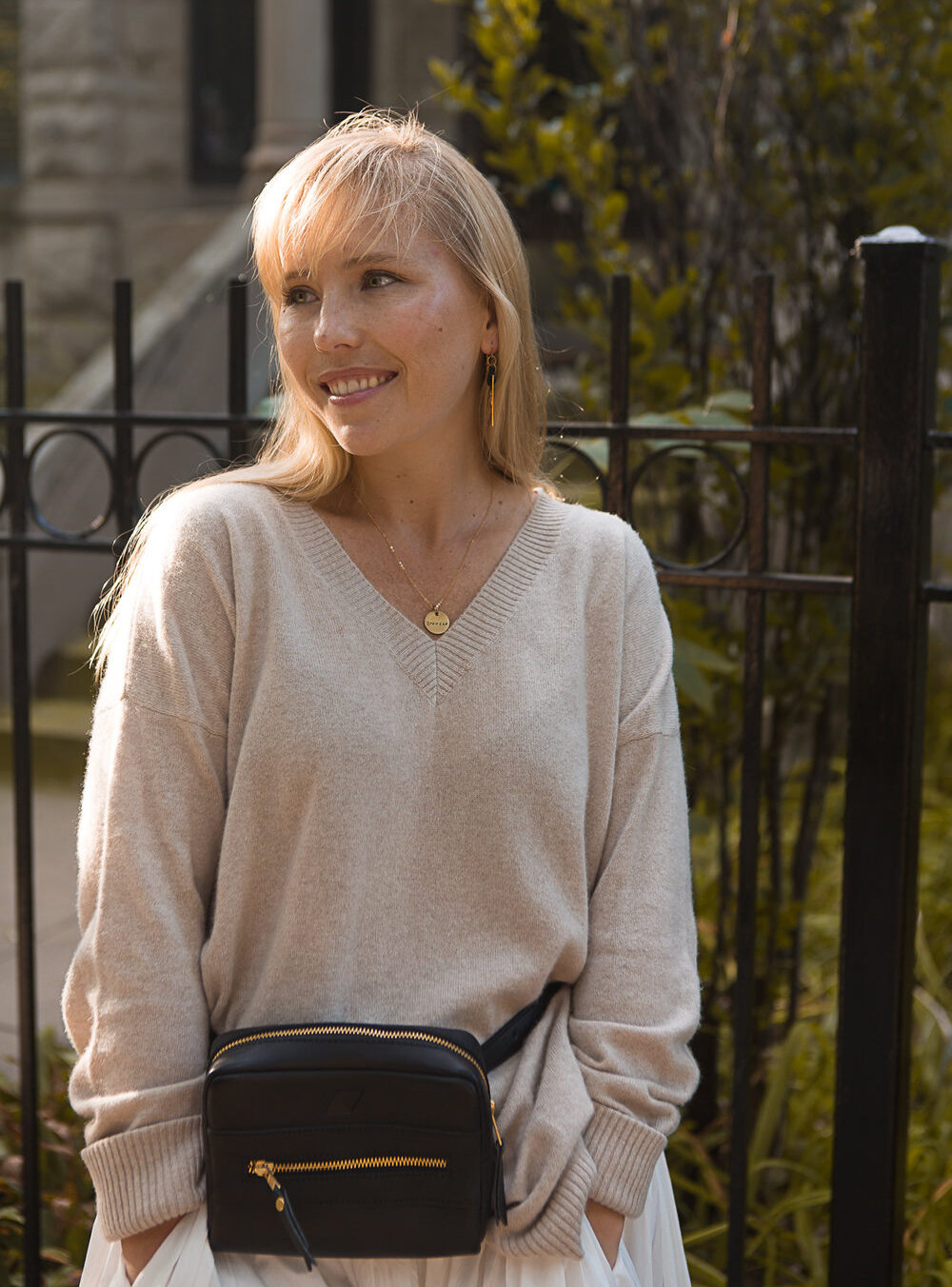 Abby Alley
Abby Alley
Founder: Abby Alley
Business: Abby Alley
WEI Accelerator Cohort: Third
The Chicago-based brand Abby Ally sells bags and jewelry that are sustainably handcrafted by artisans in East Africa. When the pandemic hit, founder Alley faced three big challenges in her business.
“First, selling at events and in-person trunk shows made up about 30% of my annual revenue in 2019, and as we now know, events just were not possible in 2020,” she says. “I had to figure out how to not only fill that 30% gap, but grow my business so we could survive.
“The second challenge was figuring out the best way to produce new collections given the pandemic was deeply impacting our artisan partners in East Africa. And finally, there was a lot of uncertainty about whether people would be buying handbags and jewelry when we were all staying home, wearing sweats.”
Alley quickly began growing her ecommerce sales, using the money she earmarked for trade shows and events to invest in online advertising. She also had to significantly slow down her production and decided to launch mini collections throughout the year – a model she plans to stick with in the future.
Alley also released a new product – the Sling Bag purse – that sold incredibly well. “Even though people were not buying big totes as much as they used to, people still needed a bag to carry when they went on walks or to the grocery store,” she says. Alley also discovered that her customers continued to buy her jewelry products. "Jewelry is just something that makes us feel good and put together. Sometimes we just need that.”
By the end of 2020, Alley ended up seeing a 40% increase in sales from the previous year.
Alley’s advice for fellow entrepreneurs: “Listen to your customers! Figure out what they need and find a way to fill that gap.”
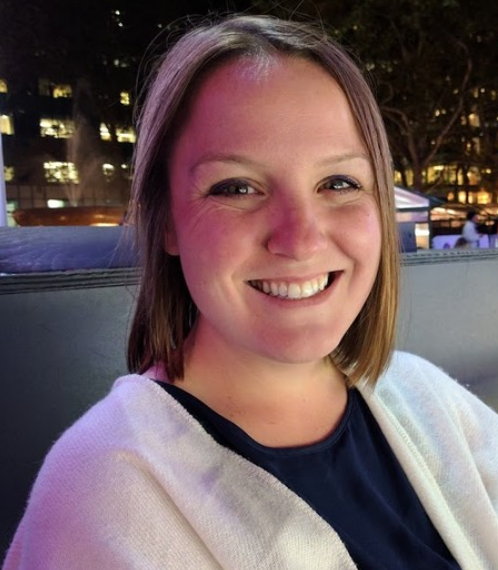 Jessie Feller (CMN ’14)
Jessie Feller (CMN ’14)
Founder: Jessie Feller (CMN ’14)
Business: Aged & Infused
WEI Accelerator Cohort: Second
Cocktail-lover Jessie Feller co-founded her business, Aged & Infused, with her husband John. The company produces cocktail infusion kits, which includes everything needed for an at-home cocktail: a 16-ounce jar, pre-measured ingredients, infusing directions and a hand-made filtering pour spout.
Jessie’s business depended on in-person events and retail as major income sources – two areas that were impacted by safety restrictions after the coronavirus hit the U.S. last March.
Thankfully, the venture’s infusion kits were already suitable for at-home mixology. The co-founders leaned into virtual experiences such as online cocktail demos and classes to keep their customers engaged. “We also put a huge focus on mixology education to help folks up their cocktail game at home,” Jessie explains. “From recipes to glassware recommendations to bar cart inspiration and beyond, we’re always striving to bring new ideas, tips and tricks to cocktail lovers.”
Jessie’s advice for fellow entrepreneurs: “Don’t be afraid to try something new with your business. That’s when the good stuff happens! Even if you fail, tomorrow is a brand new day to try again. And when all else fails…pour yourself a glass of whiskey!”
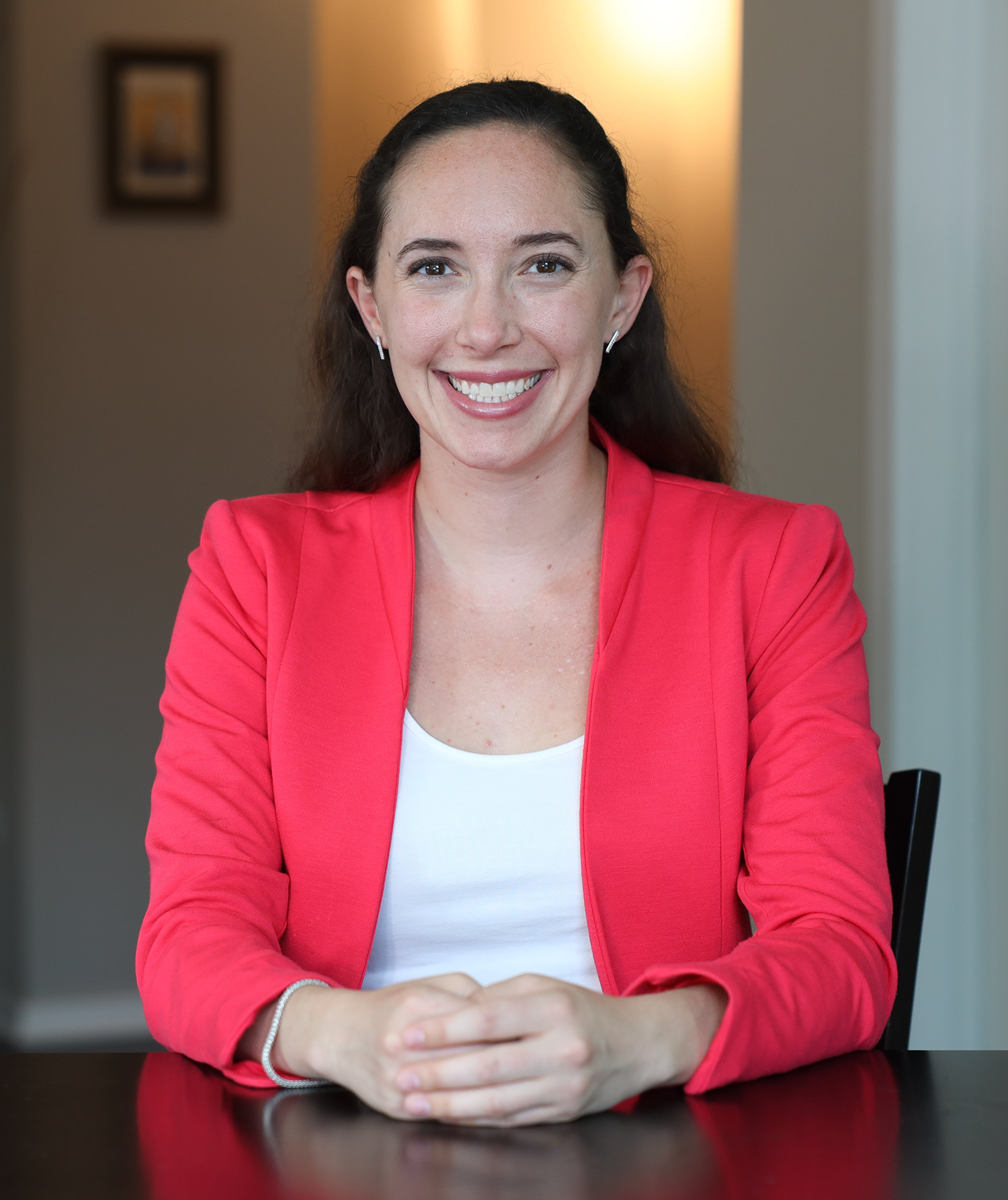 Elise Gelwicks
Elise Gelwicks
Founder: Elise Gelwicks
Business: Eleview Consulting
WEI Accelerator Cohort: First
Elise Gelwicks launched Eleview Consulting to help professional service firms turn their young professionals into client-ready leaders.
To combat the impact of the pandemic, Gelwicks' first step was to figure out how to continue bringing in revenue. “Since most of our revenue stems from live workshops, I quickly designed our professional development workshops to be virtual,” she says.
Gelwicks then needed to find a way to adapt to the changing needs of her clients. Several Eleview Consulting clients needed programming to address virtual communication and strategies to avoid distraction while working from home. “We worked closely with our clients to custom-create professional development experiences that covered these topics,” she says. “These are now some of our most popular programs.”
Gelwicks' business ended up growing more than 400% during the COVID-19 outbreak. “Much of that growth is attributed to the women founders of WEI who gave their time and energy to advising me through this challenging period,” she adds. “I’m so grateful for their support.”
Gelwicks' advice for fellow entrepreneurs: “Get scrappy. Know that there is a way to make it work and you have to creatively brainstorm ways to keep the business afloat. Desperation is a powerful force; if you're desperate to keep your business alive you absolutely will find a way to make it happen.”
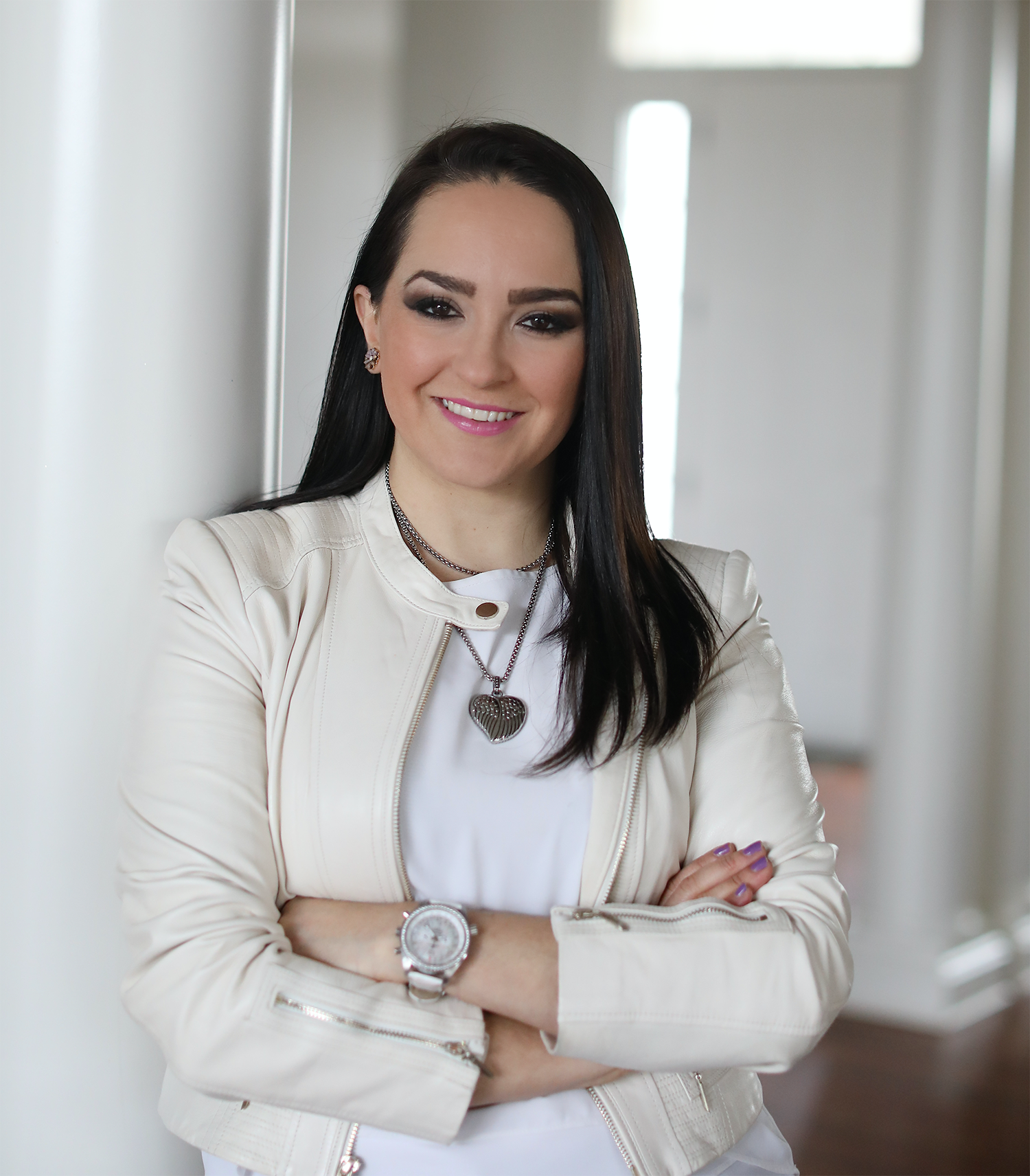 Jacqueline Camacho-Ruiz
Jacqueline Camacho-Ruiz
Founder: Jacqueline Camacho-Ruiz
Business: Fig Factor Media
WEI Accelerator Cohort: Third
Drawing from her love affair with books at an early age, Jacqueline Camacho-Ruiz founded Fig Factor Media, a full-service publishing house. Since the pandemic started, the company hired three new team members to sustain the author demand – the highest growth in the company’s six-year history.
“2020 has tested every aspect of our business at Fig Factor Media,” Camacho-Ruiz says. “From processes, to onboarding new clients, new hires, and profits and losses management, there were opportunities to strategically grow.
“We decided to create more offerings by encapsulating our intellectual property more than ever before, and to sparkle kindness to our fellow businesses and authors by shipping out care packages and teddy bears,” she says.
Camacho-Ruiz’s advice for fellow entrepreneurs: “I recommend using hardship as an opportunity to reflect on what needs to be done to pivot your approach during difficult times and apply best practices to continue to grow and learn. Consider opportunities that will align with new strategic partnerships to expand market reach, and find a way to continue the upward trend of growth by expanding your offerings and being more flexible with clients.”
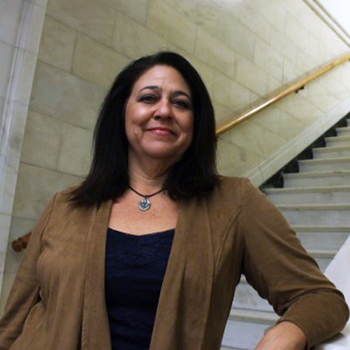 Nora Wall
Nora Wall
Founder: Nora Wall
Business: EduCalc
WEI Accelerator Cohort: First
After joining the program’s first cohort, Nora Wall launched EduCalc, a consulting and training business that offers information, resources and research to parents and teachers for students struggling in math.
Soon after the start of the pandemic, Wall had multiple face-to-face training workshops scheduled. Immediately she pivoted to exclusively offering online training while dealing with an influx of returning clients who needed help navigating remote teaching and learning.
“While the business growth was appreciated, I was also dealing with the same personal issues we all faced – worrying about this new virus and keeping myself and my adult children calm in the face of uncertainty,” says Wall, who also works as an online learning coordinator for DePaul University. “So part of the pivot included tapping greater reserves of patience, peace and calmness for myself, my family and my clients”
She expanded her online teacher training workshops and began revising her own online footprint, which included website consolidation and acquiring new recording equipment.
However, this wasn’t the first time Wall has dealt with hardship. Wall has also survived divorce, Hurricane Katrina, and moved from the south to the Midwest in 2018 due to a massive and unexpected drop in business involving a previous venture in publishing.
Wall’s advice for fellow entrepreneurs: “My best advice for fellow female entrepreneurs is to remember that your dreams always belong to you; they can't be taken away. You might have to take on a side hustle, or reduce your sales, growth or marketing for a bit, or you might have to start your dream from scratch more than once. That's OK! As long as you don't give up on your business, you can continue. You can rebuild. Ride the wave of uncertainty until you get back to calm waters.”
Learn more about: